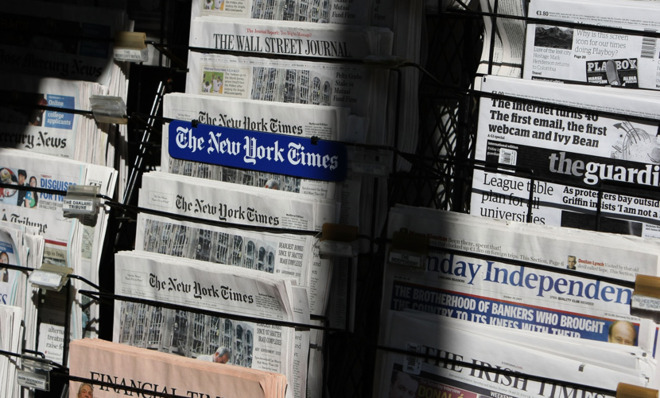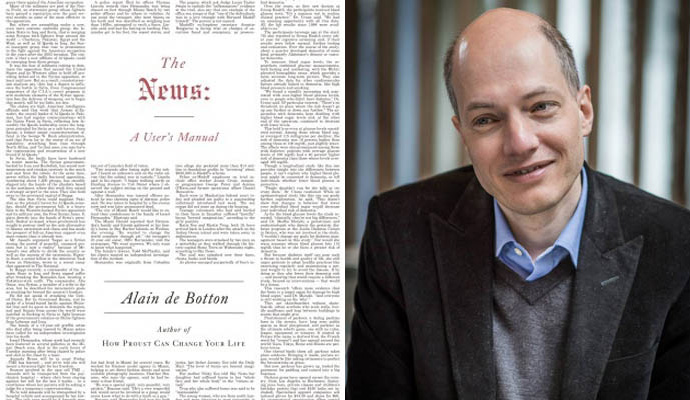The future of news
News sources can't just give us the facts. They must tell us what those facts mean.

A free daily email with the biggest news stories of the day – and the best features from TheWeek.com
You are now subscribed
Your newsletter sign-up was successful
NEWS ORGANIZATIONS ARE coy about admitting that what they present us with each day are minuscule extracts of narratives whose true shape and logic can generally only emerge from a perspective of months or even years — and that it would hence often be wiser to hear the story in chapters rather than snatched sentences. They are institutionally committed to implying that it is inevitably better to have a shaky and partial grasp of a subject this minute than to wait for a more secure and comprehensive understanding somewhere down the line.
Given the dangers of confusion that result, what we need above all are good signposts. Under a headline such as "Man in Russia Consults Lawyer," an extract from a novel — even one of Anna Karenina's power — will seem irksome. However, if we were told that we were reading a small, slightly monotonous passage that belonged to an extraordinary thousand-page book exploring the tragic dimensions of marriage, in particular the tension between the desire for adventure and the demands of domesticity and social conformity, we might anticipate a next installment with a little more excitement.
We need news organizations to help our curiosity by signaling how their stories fit into the larger themes on which a sincere capacity for interest depends. To grow interested in any piece of information, we need somewhere to "put" it, which means some way of connecting it to an issue we already know how to care about. A section of the human brain might be pictured as a library in which information is shelved under certain fundamental categories. Most of what we hear about day to day easily signals where in the stacks it should go and gets immediately and unconsciously filed: News of an affair is put on the heavily burdened shelf dedicated to How Relationships Work, a story of the sudden sacking of a CEO slots into our evolving understanding of Work & Status.
The Week
Escape your echo chamber. Get the facts behind the news, plus analysis from multiple perspectives.

Sign up for The Week's Free Newsletters
From our morning news briefing to a weekly Good News Newsletter, get the best of The Week delivered directly to your inbox.
From our morning news briefing to a weekly Good News Newsletter, get the best of The Week delivered directly to your inbox.
But the stranger or the smaller stories become, the harder the shelving process grows. What we colloquially call "feeling bored" is just the mind, acting out of a self-preserving reflex, ejecting information it has despaired of knowing where to place. We might, for example, struggle to know what to do with information that a group of Chinese officials was paying a visit to Afghanistan to discuss border security in the province of Badakhshan or that a left-wing think tank was agitating to reduce levels of tax in the pharmaceutical industry. We might need help in transporting such orphaned pieces of information to the stacks that would most appropriately reveal their logic.

IT IS FOR news organizations to take on some of this librarian's work. It is for them to give us a sense of the larger headings under which minor incidents belong. An item on a case of petty vandalism one Saturday night in a provincial town ("Bus Shelter Graffitied by Young Vandals in Bedford") might come to life if it was viewed as a minuscule moment within a lengthier drama titled "The Difficulties Faced by Liberal Secular Societies Trying to Instill Moral Behavior Without the Help of Religion." Likewise, an indigestible item about yet another case of government corruption in the Democratic Republic of Congo ("Kickback Accusations in DRC") could be enhanced by a heading that hinted at its grander underlying subject: "The Clash Between the Western Understanding of the State and the African Notion of the Clan."
Properly signposted, even an unfortunate account of the change to the government housing benefit system would stand a chance. In reality, this article is no more about what its headline announces — "Tenants' Rent Arrears Soar in Pilot Benefit Scheme" — than Anna Karenina is about a man in Russia who consults a lawyer. It is about the ongoing inquiry by the modern state into how best to assist its poorest members; it is part of a hundred-year debate about whether welfare lends its recipients dignity and support or subtly humiliates them by fostering dependence. It is a single episode in a multichaptered narrative that might be called "How Subsidy Affects Character," "The Psychology of Aid," or, more sonorously and abstractly, "The Responsibility for Poverty."
Unfortunately for our levels of engagement, there is a prejudice at large within many news organizations that the most prestigious aspect of journalism is the dispassionate and neutral presentation of "facts." CNN's slogan, for instance, is "Bringing you the facts"; NRC Handelsblad of the Netherlands touts its ability to "deliver fact, not opinion"; the BBC vaunts itself as "the world's most reliable source of facts."
A free daily email with the biggest news stories of the day – and the best features from TheWeek.com
The problem with facts is that there is nowadays no shortage of sound examples. The issue is not that we need more of them, but that we don't know what to do with the ones we have. Every news day unleashes another flood: We learn that Standard & Poor's is reviewing the nation's credit rating, that there has been an extension to the government spending bill, that voting boundaries have been submitted to a committee, and that plans for a natural-gas pipeline have begun to be drawn up. But what do these things actually mean? How are they related to the central questions of political life? What can they help us to understand?
The opposite of facts is bias. In serious journalistic quarters, bias has a very bad name. It is synonymous with malevolent agendas, lies, and authoritarian attempts to deny audiences the freedom to make up their own minds.
YET WE SHOULD perhaps be more generous toward bias. In its pure form, a bias simply indicates a method of evaluating events that is guided by a coherent underlying thesis about human functioning and flourishing. It is a pair of lenses that slide over reality and aim to bring it more clearly into focus. Bias strives to explain what events mean and introduces a scale of values by which to judge ideas and events. It seems excessive to try to escape from bias per se; the task is rather to find ways to alight on its more reliable and fruitful examples.
Although certain grating right- and left-wing varieties dominate our understanding of the term bias, there are ultimately as many biases as there are visions of life. There are countless worthy lenses to slide between ourselves and the world. We might, for example, interpret the news according to the distinctive biased perspectives of Walt Whitman or Jane Austen, Charles Dickens or the Buddha. One could imagine a news outlet with a psychoanalytic bias, focusing on issues of guilt and envy on both sides of the Arab-Israeli conflict, alive to the idea of projection in political debates and highly skeptical that "depression" had set in across the country because the economy had contracted by 0.1 percent or indeed that happiness was inevitable because it was set to expand by 1.3 percent.
What should be laudable in a news organization is not a simple capacity to collect facts, but a skill — honed by intelligent bias — at teasing out their relevance.
Central to modern politics is the majestic and beautiful idea that every citizen is — in a small but highly significant way — the ruler of his or her own nation. The news has a central role to play in the fulfillment of this promise, for it is the conduit through which we meet our leaders, judge their fitness to direct the state, and evolve our positions on the most urgent economic and social challenges of the day. Far from being incidental features of democracies, news organizations are their guarantors.
Hegel's argument that the news now occupies the same prestigious position in society as religion once did misses out an important difference between the two fields of knowledge: Religions have traditionally been particularly sensitive to how bad we are at focusing on anything. Exactly like the news, religions want to tell us important things every day. But unlike the news, they know that if they tell us too much, in one go, and only once, then we will remember — and do — nothing.
They therefore take care to serve up only a little of their fare each day, taking us patiently through a few issues and then returning to them again and again. Repetition and rehearsal are key to the pedagogical methods of the major faiths. They know there is no point informing us of a vital cause in a hurried and excitable way. They sit us down in a solemn place, quiet our minds, and then speak to us with dignified urgency rather than panic, understanding that we will have to return to their ideas over days and weeks if we are to stand any chance of being influenced in how we think and behave.

IT WOULD BE easy to suppose that the real enemy of democratic politics must be the active censorship of news — and therefore that the freedom to say or publish anything would be the natural ally of civilization. But the modern world is teaching us that there are dynamics far more insidious and cynical still than censorship in draining people of political will; these involve confusing, boring,and distracting the majority away from politics by presenting events in such a disorganized, fractured, and intermittent way that a majority of the audience is unable to hold on to the thread of the most important issues for any length of time.
A contemporary dictator would not need to do anything so obviously sinister as banning the news: He or she would only have to see to it that news organizations broadcast a flow of random-sounding bulletins, in great numbers but with little explanation of context, within an agenda that kept changing, without giving any sense of the ongoing relevance of an issue that had seemed pressing only a short while before, the whole interspersed with constant updates about the colorful antics of murderers and film stars. This would be quite enough to undermine most people's capacity to grasp political reality — as well as any resolve they might otherwise have summoned to alter it. The status quo could confidently remain forever undisturbed by a flood of, rather than a ban on, news.
A popular perception that political news is boring is no minor issue; for when news fails to harness the curiosity and attention of a mass audience, a society becomes dangerously unable to grapple with its own dilemmas and therefore to marshal the popular will to change and improve itself.
But the answer isn't just to intimidate people into consuming more "serious" news; it is to push so-called serious outlets into learning to present important information in ways that can properly engage audiences. It is too easy to claim that serious things must be, and can almost afford to be, a bit boring. The challenge is to transcend the current dichotomy between those outlets that offer thoughtful but impotent instruction on the one hand and those that provide sensationalism stripped of responsibility on the other.
In the ideal news organization of the future, the ambitious tasks of contextualization and popularization would be taken so seriously that stories about welfare payments would be (almost) as exciting as those about incestuous antipodean cannibals.
From the book: The News: A User's Manual by Alain de Botton. ©2014 by Alain de Botton. Published by arrangement with Pantheon Books, an imprint of The Knopf Doubleday Publishing Group, a division of Random House LLC.
-
 Political cartoons for February 16
Political cartoons for February 16Cartoons Monday’s political cartoons include President's Day, a valentine from the Epstein files, and more
-
 Regent Hong Kong: a tranquil haven with a prime waterfront spot
Regent Hong Kong: a tranquil haven with a prime waterfront spotThe Week Recommends The trendy hotel recently underwent an extensive two-year revamp
-
 The problem with diagnosing profound autism
The problem with diagnosing profound autismThe Explainer Experts are reconsidering the idea of autism as a spectrum, which could impact diagnoses and policy making for the condition